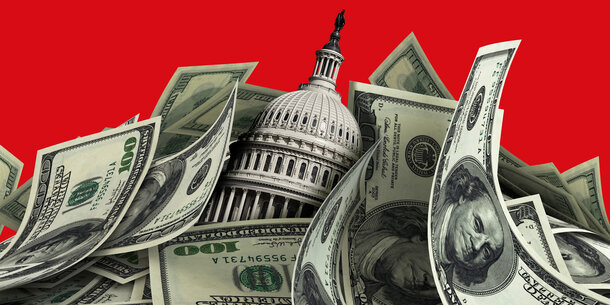20. Fundraising did not stop for snow, nor rain, nor heat, nor gloom of night, nor a pandemic
Trump attended many political fundraisers in person during the coronavirus pandemic, including a $250,000 per person fundraiser at his Bedminster golf club in New Jersey right before revealing that he tested positive for Covid-19 in October.
19. Campaign finance crimes don’t pay
Ex-congressman Duncan Hunter was sentenced to 11 months in jail for his personal use of campaign funds, including flying the family rabbit Eggburt on vacation. His wife Margaret Hunter was sentenced to 8 months of home confinement in August for her role in the crime.
18. There is still an appetite for campaign finance reform
In Alaska, voters passed Measure 2, which included campaign finance reform including greater transparency of money in politics.
17. The Meadowlarks learned to sing new tune
Oregon was one of the only states that lacked campaign contribution limits because of a 1997 state supreme court ruling that they violated the state’s constitution. This year, Oregonians passed a constitutional amendment to create caps on contributions to candidates.
16. The candidate with more money won most of the time
The presidential election in 2016 was an outlier because the candidate with less money won: Trump. But in 2020, the candidate with the most fundraising success also had electoral success: Biden. In fact, Joe Biden raised more money in a month in 2020 than Trump did in his entire 2016 run. In Congressional races in 2020, the candidate with more money won over 88 percent of the time.
15. The rules of game changed for the worse (example 1)
Ever since Citizens United v. FEC allowed corporations to spend an unlimited amount of money in American elections, shareholders have been trying to hold publicly traded companies accountable using securities laws. This year, the Securities and Exchange Commission changed its shareholder proposal rules in a way that makes fighting dark money harder.
14. The rules of game changed for the worse (example 2)
One of the unsolved problems of campaign finance is the lack of transparency about who is spending in elections. One way that transparency is lost is when opaque nonprofits are used to create dark money. The IRS changed the rules in May to make dark money darker by deleting the requirement that dark money nonprofits file a list of donors with the IRS.
13. Dark money went digital
After concerns that foreign actors like Russia were spending money in U.S. elections through social media, Facebook and Google became more transparent about who was buying political ads on their platforms. This allowed researchers to see new vistas of dark money being spent in American elections in near real-time in 2020. According to the Wesleyan Media Project, $26 million was spent by the top 15 biggest dark spenders on Facebook and Google ads during 2020.
12. Even the president’s daughter is not above the law
The Trump inaugural committee is still being investigated because millions of dollars seemed to disappear and some of the money came from foreign sources, which is illegal. A lot of the funds ended up at the Trump Organization. The District of Columbia is pursuing its investigation through a civil suit. In November, the president’s daughter Ivanka was deposed by the DC attorney general’s office for possibly misusing inaugural funds by overcharging the inaugural committee for space in the a Trump hotel.
11. Yarn from the Ukraine scandal kept unraveling
In October 2020, Lev Parnas and Igor Fruman pled not guilty again to various crimes including campaign finance crimes. Parnas and Fruman stand accused of violating the ban on foreign donations by facilitating payments from foreigners to an American Super PAC allegedly in exchange for getting the U.S. ambassador to the Ukraine fired. Their scheme allegedly included $2 million going through an entity called Fraud Guarantee.
10. Trump’s campaign managers kept getting in trouble
In 2016, Trump burned through campaign managers including Paul Manafort (imprisoned and then sent to home confinement), Steve Bannon (under federal indictment), Corey Lewandowski (accused of sexual assault), and KellyAnne Conway (accused of Hatch Act violations). In 2020, Brad Parscale had a long run being Trump’s campaign manager. He may have helped hide $170 million for the Trump campaign. But Parscale was given his pink slip in July, and press reports indicate that he may have embezzled money from the campaign.
9. Money can’t buy you love
Billionaire candidates made a lot of waves during the Democratic primary. But all the billionaires failed to clinch the presidency. Michael Bloomberg spent $1 billion and Tom Steyer spent $340 million, and neither one got the nomination.
8. There may have been more campaign finance crimes in the 2016 election by Trump
The New York Times in September revealed that it had several years of Trump’s tax returns in hand. These documents raise new questions including whether a loan to Trump in 2016 may have violated campaign finance laws.
7. A pardon may have been for sale at the White House
A batch of presidential pardons in February all seemed to have links to campaign finance donors, but it may have been a pardon that Trump did not grant — to Hugh Leslie Baras (who later died) — that may lead to criminal trouble. An unsealed court document indicates that a campaign-donations-for-pardons scheme could have occurred at the White House in connection with the would-be Baras pardon.
6. Courts still believe in transparency
The ruling in Citizens for Responsibility and Ethics in Washington (CREW) v. Federal Election Commission (FEC) was a win for disclosure of money in politics and a loss for dark money groups that had relied on the FEC’s lax rules to do business. The decision by the DC Circuit Court of Appeals will likely make a difference in post-2020 elections once the FEC regains its quorum under the incoming Biden administration.
5. Who is postmaster general actually matters
Until 2020, few knew who happened to be the postmaster general. But in 2020, when Trump donor Louis DeJoy assumed the post, he drew ire for two reasons related to elections: slowing the mail when millions of voters were voting by mail and possibly violating laws that govern money in politics. He may have violated campaign finance laws before he joined the government by making his private sector employees donate and then paying them back. This is the same type of action landed George Steinbrenner with a criminal record.
4. Winning control of the Senate will cost a pretty penny
In 2020, $1.5 billion was spent on Senate races, and the Georgia runoff on January 5 will determine who controls it next year. So campaign money is pouring in on all sides for a race that started in 2020 and will end in 2021. Thus, Georgia’s runoff elections are on pace to be first and second most expensive senate seat fights in history.
3. Congress can ignore an elephant in the room during impeachment
Although the House considered including campaign finance crimes in its articles of impeachment since soliciting a thing of value (opposition research on the Biden family) from a foreign government (Ukraine) during an election was arguably a federal crime, it chose not to. Thus, Trump’s impeachment and trial, which ended in February, weirdly skipped campaign finance law.
2. Dark money can hide a criminal conspiracy
The Speaker of the House of Ohio Larry Householder was arrested and indicted for his alleged role in a dark money bribery scheme that involved a company called First Energy and $60 million changing hands. Some of this money was spent in Ohio through dark money conduits controlled by Householder, and he was ousted as speaker. But in a less encouraging turn of events, Householder won reelection in 2020, so he is still in the legislature.
1. It’s never too late to soak contributors for one last dime
The 2020 election was the most expensive federal election ever. After Trump lost the 2020 presidential election, he continued to fundraise, ostensibly to fund the legal battles in multiple states seeking baselessly to overturn the election. However, fine print in the solicitations for money indicate that most of the money is not going to the legal bills at all, but rather fund political committees, including one called Save America, that Trump will control post-presidency. In fact, Trump seemed to raise more money postelection that he did on election eve, in what appears to be a one last grift of his loyal supporters.
The views expressed are the author’s own and not necessarily those of the Brennan Center.



